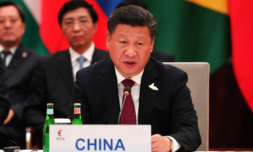The legislation signed by President Joe Biden allocates $95 billion in emergency spending for aid to Ukraine, Israel, and Taiwan. However, critics argue that the aid package reflects US efforts to maintain global leadership amid a potential power grab by China.
In late April, President Joe Biden signed a $95 billion bipartisan emergency spending law to provide aid for US allies Ukraine, Israel, and Taiwan.
An estimated $26 billion is allocated for Israel to boost its defenses in the Israel-Hamas war. The package also includes $9 billion for humanitarian purposes in the Gaza Strip and the occupied West Bank.
As for Ukraine, $60.84 billion is to be provided to replenish stockpiles of weapons from the US and develop the nation’s military and non-military assistance, which includes the salaries of government personnel.
Additionally, Biden’s ally in the Asia-Pacific, Taiwan, is set to get $8.12 billion from the aid package.
Reponses from nations
On the Israel front, despite the allocation made for humanitarian assistance, any funding to the United Nations Fund for Palestinian Refugees (UNRWA) has been barred after Israel accused the organisation’s staff of being involved in the October 7 attacks by Hamas.
This suspension has put significant pressure on UNRWA, jeopardizing its ability to provide essential services to over 1.7 million Palestinians.
However, other countries from the West, such as Spain, Canada, Australia, the United Kingdom, and the European Union, have resumed or increased their funding to UNRWA.
The US Congress just overwhelmingly passed a much appreciated aid bill that demonstrates strong bipartisan support for Israel and defends Western civilization. Thank you friends, thank you America!
— Benjamin Netanyahu – בנימין נתניהו (@netanyahu) April 20, 2024
Unsurprisingly, the portion allocated to Ukraine was negatively received by the Russians. Dmitry Peskov, a Kremlin spokesman, described the approval of aid to Ukraine as anticipated and foreseen.
He suggested that it would benefit the US economically but negatively impact Ukraine, potentially leading to more Ukrainian casualties, which he attributed to the Kyiv government.
Russian Foreign Ministry spokeswoman Maria Zakharova warned that Russia will give ‘an unconditional and resolute response’ to the US becoming more involved in the Ukraine war.
With increasing friction in the South China Sea, the Taiwanese Ministry stated that it would collaborate with the US through established exchange mechanisms to coordinate the allocation of funds. Furthermore, it pledged to enhance combat readiness capabilities to safeguard national security and maintain peace and stability in the Taiwan Strait.
Why did the legislation take time to pass?
The legislation that seems like a massive feat on the end of the US was not approved overnight and took months of delays and contentious debate to be approved.
The White House had requested the foreign aid package in October 2023, but there was uncertainty surrounding its future amid opposition from the newly installed House Speaker Mike Johnson.
Johnson’s appointment to the House introduced a period of transition, uncertainty, and the need to establish new leadership priorities, leading to delay. However, compromises were made by both the Democratic and Republican parties that got the ball rolling again on the package.
The initial $118 billion aid package faced stern opposition, so it was scaled down to $95 billion to gain more Republican support.
The House also added language requiring Biden to seek repayment from Ukraine for around $10 billion in economic assistance, another concession to gain GOP backing. Biden even personally lobbied Johnson to move the aid package forward, enlisting top administration officials to emphasize the importance of the assistance.
The final Senate vote was 79-18, with 15 Republicans joining Democrats and an independent to pass the legislation.




















